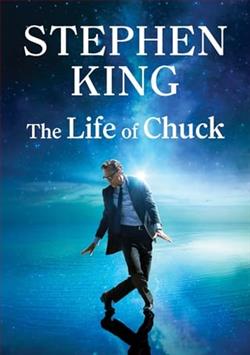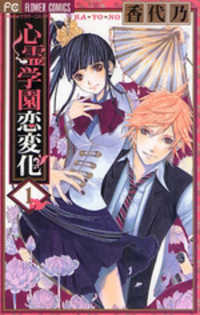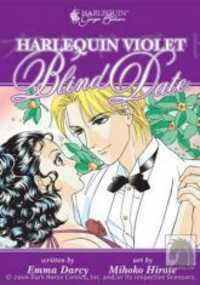
The Life of Chuck
by Stephen King
In a crumbling world plagued by natural disasters, collapsing infrastructure, and mass panic, bizarre billboards and advertisements appear throughout town: “Charles Krantz. Thirty-nine great years. Thanks, Chuck!” Marty Anderson, a schoolteacher, becomes obsessed with these messages as the world, inexplicably linked to Chuck’s life, seems to be approaching its end.
Told in three acts, presented in reverse order, The Life of Chuck explores one man’s past. We see him in middle age on a business trip in Boston as he is seduced by a busker into spinning a gorgeous sidewalk dance. And we see him as a child, in a house haunted by a terrible secret, learning to dance with his grandmother. In these pages King reminds us that life’s quotidian pleasures are even more glorious because they are fleeting: the outrageous good fortune of a beautiful blue day after a string of gray ones; the delight of dancing when every move feels perfect; a serendipitous meeting. King’s ability to describe pure joy rivals his ability to terrify us.
Now a major motion picture and winner of the Toronto International Film Festival People’s Choice Award, The Life of Chuck is a glorious story about community and about humanity at its best, a celebration of joy, mystery, existential wonder, and the multitudes contained in all of us.
.
Read
The Life of Chuck on http://kissnovel.net
Martial Peak Reviews
Stephen King, a master of weaving intricate tales that delve into the human psyche, takes a bold and refreshing approach in The Life of Chuck. This novel, structured in three acts presented in reverse chronological order, is a poignant exploration of life, memory, and the interconnectedness of human experiences. King, known for his ability to evoke terror, here demonstrates his equally profound capacity to evoke joy and existential wonder.
The narrative begins with a world on the brink of collapse, where natural disasters and societal breakdowns are rampant. Amidst this chaos, mysterious billboards appear, celebrating the life of Charles Krantz with the message, “Thirty-nine great years. Thanks, Chuck!” This intriguing premise sets the stage for a deep dive into Chuck's life, as seen through the eyes of Marty Anderson, a schoolteacher who becomes fixated on these cryptic messages. The novel’s structure, moving backward through time, allows readers to peel back the layers of Chuck’s life, revealing the profound impact of seemingly mundane moments.
One of the most striking aspects of The Life of Chuck is its exploration of the theme of impermanence. King masterfully illustrates how life’s fleeting moments are often the most significant. Through Chuck’s experiences, readers are reminded of the beauty in everyday occurrences—the joy of a sunny day after a series of gloomy ones, the exhilaration of a spontaneous dance, and the serendipity of chance encounters. These moments, though transient, are imbued with a sense of magic and wonder that King captures with remarkable clarity.
Character development is another area where King excels in this novel. Chuck Krantz is portrayed not just as an individual, but as a representation of the collective human experience. His life, filled with both triumphs and tribulations, resonates with readers on a personal level. King’s ability to create such a relatable and multidimensional character is a testament to his storytelling prowess. Marty Anderson, the schoolteacher who becomes obsessed with Chuck’s billboards, serves as a conduit for the reader’s own curiosity and introspection. Through Marty’s eyes, we are invited to ponder the significance of our own lives and the legacies we leave behind.
In terms of style, King’s prose in The Life of Chuck is both lyrical and evocative. His descriptions of the crumbling world and the vibrant moments of Chuck’s life are vivid and immersive. King’s ability to shift seamlessly between the mundane and the extraordinary is particularly noteworthy. This balance between the ordinary and the fantastical is reminiscent of works by authors such as Haruki Murakami and Neil Gaiman, who similarly explore the intersection of reality and the surreal.
Moreover, the novel’s structure, with its reverse chronological order, adds a layer of complexity that enhances the narrative’s impact. This unconventional storytelling technique invites readers to piece together the puzzle of Chuck’s life, creating a sense of engagement and intrigue. It also underscores the novel’s central theme of interconnectedness, as each act reveals how past events shape the present and future.
Comparatively, The Life of Chuck shares thematic similarities with works like The Curious Case of Benjamin Button by F. Scott Fitzgerald, where the exploration of time and the human condition are central. However, King’s novel stands out for its unique blend of existential reflection and celebration of life’s simple joys. It is a testament to King’s versatility as a writer, showcasing his ability to transcend genres and deliver a story that is both thought-provoking and emotionally resonant.
Overall, The Life of Chuck is a remarkable addition to Stephen King’s oeuvre. It is a novel that challenges readers to reflect on their own lives and the moments that define them. Through Chuck’s story, King reminds us of the beauty and fragility of life, urging us to cherish the present and embrace the mysteries of existence. This novel is not just a celebration of one man’s life, but a tribute to the myriad experiences that make us human.
For those interested in exploring a narrative that combines existential themes with a celebration of life’s fleeting pleasures, The Life of Chuck is a must-read. It is a story that will linger in the minds of readers long after the final page is turned, offering a profound meditation on the nature of life, death, and everything in between.
























Reviews 0
Post a Reviews: